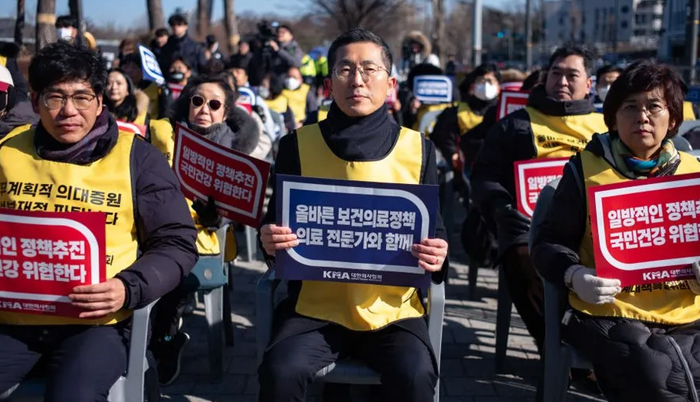![]() Home > Asia
Home > Asia
South Korean Doctors Strike In Protest Of Plans To Add More Physicians

GETTY IMAGES | Doctors in Seoul protesting against the government's plan to bump up numbers
![]() February 21st, 2024 | 00:39 AM |
February 21st, 2024 | 00:39 AM | ![]() 1050 views
1050 views
SOUTH KOREA
Surgeries have been delayed and hospitals have turned away patients after more than 1,600 doctors in South Korea went on strike on Tuesday.
The junior doctors are protesting the government's plans to introduce more trained physicians into the system.
South Korea has one of the lowest doctor-to-patient ratios among major economies, so the government wants to add more medical school placements.
But doctors oppose the prospect of greater competition, observers say.
South Korea has a highly privatised healthcare system where most procedures are tied to insurance payments, and more than 90% of hospitals are private.
Its doctors are among the best-paid in the world, with 2022 data from the Organisation for Economic Co-operation and Development (OECD) showing the average specialist at a public hospital receives nearly $200,000 (£159,000) a year; a salary far exceeding the national average pay.
But there are currently only 2.5 doctors per 1,000 people - the second lowest rate in the OECD group of nations after Mexico.
"More doctors mean more competition and reduced income for them... that is why they are against the proposal to increase physician supply," said Prof Kwon Soon-man, a public health expert at Seoul National University.
The country has critical physician shortages in remote areas, and in specialities such as paediatrics and obstetrics - which are seen as less lucrative fields compared to practices such as dermatology and plastic surgery.
What has happened this week?
Nearly 6,500 interns and residents - about half of the junior doctor workforce - tendered resignation letters on Monday, the country's health ministry said.
Of that group, about 1,600 doctors failed to turn up to work. Protest organisers - the Korean Medical Association and Korea Interns and Residents Association - had urged members to stop work entirely on Tuesday.
The government has ordered doctors to go back to work with President Yoon Suk-yeol condemning a campaign he said was "taking people's lives and health hostage".
He said he was aware of cases where cancer surgeries had already been postponed due to the walk-outs. South Korean media have also reported cases of patients having to be discharged or transferred to other hospitals.
Junior doctors form a core contingent of staff in emergency wards, and Yonhap reported that up to 37% of doctors could be affected at the biggest hospitals in Seoul.
"We are deeply disappointed in the situation where trainee doctors are refusing to work," Second Vice Health Minister Park Min-soo had told reporters earlier this week.
On Tuesday he said the government would resort to legal means to break the strike- authorities have statutory power to revoke a doctor's practicing licence if their actions threaten national healthcare.
The country has previously brought prosecutions against doctors who were striking. The government said it was taking steps on Tuesday against two officials of the Korean Medical Association.
"We earnestly ask the doctors to withdraw their decision to resign en masse," Mr Park said.
The full extent of the strike's impact is yet unclear. However, several hospitals have said they have switched to contingency plans and officials warned of gaps.
The government earlier this week also pledged to expand telehealth services during the strikes.
South Korean policy makers have been trying for decades to increase the number of doctors, as the country is dealing with a rapidly-ageing population which will put extra burden on the medical system.
President Yoon Suk-yeol has proposed adding 2,000 spots per year to medical schools - a 65% increase on the current yearly intake of just over 3,000 students. That rate hasn't changed since 2006.
There is a projected shortfall of 15,000 doctors by 2035, if the government doesn't take action now, said President Yoon.
His policy has proven very popular with the public- with polls showing up to 80% support.
However doctor groups like the Korean Medical Association argue an increase would be a strain on the money available under the national health insurance scheme.
The union has also argued that more doctors wouldn't necessarily address the shortages in specific fields - despite the government specifying targeted goals for these areas.
The doctor bodies announced the strike action on Sunday after an emergency meeting with hospital representatives. While junior doctors are the first to strike there are fears that more across the profession will join.
Doctors successfully staved off the government's previous attempt to introduce more graduates in 2020 with protests which threatened to cripple hospitals during the Covid pandemic.
Up to 80% of junior doctors participated in strikes at the time.
"It is not easy to predict who will win [this time]," said Prof Kwon.
He noted that President Yoon "seems very determined" because the policy has provided a ratings-bump for a leader otherwise tarnished by political scandals.
"But a private sector dominated health system is quite vulnerable to physician strikes, i.e. it can be really shut down if doctors join full-scale strikes."
Source:
courtesy of BBC NEWS
by Frances Mao | BBC News
If you have any stories or news that you would like to share with the global online community, please feel free to share it with us by contacting us directly at [email protected]